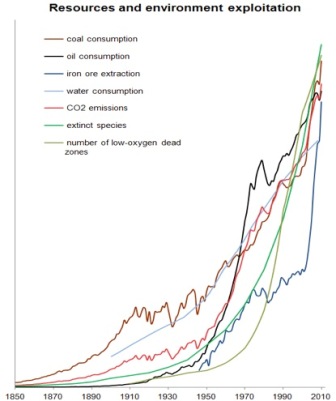While the limits and failures of our current economic and political system are known and repetitively pointed out by degrowth research, we have a deficit in the area of strategic planning for transformative politics. What is missing are entry points for politicizing and changing social values, norms and institutions. To do this successfully, it is useful to detect how hegemonic values are embedded, not only in political and economic policies, but also in everyday life.
Societal and individual reactions on the socio-ecological crisis – a paradoxical baseline situation
The societal and individual reactions on the socio-ecological crisis are characterized by paradoxical situations. Even though the ecological crisis is seen by many actors as a serious threat, there is only agreement on very moderate political and economic policies. The priority lies on market-based mechanisms and technological innovations that are supposed to lead to an ecological modernization. This paradigm is supported by powerful actors as it promises to generate so-called green growth. But these strategies have not led to a significant reduction of global emissions or resource consumption, let alone social injustice and power asymmetries so far. Nevertheless, strategies of sufficiency, environmental justice, and degrowth are neglected as they are in conflict with economic growth and prevailing power relations.
We can also observe a paradox at the individual level: the milieus with the greatest environmental awareness are, at the same time, those with the highest emissions and resource consumption. This is due to the fact that environmental self-identity statistically increases steadily as income rises – and income level, in turn, is the most significant determinant of environmental impact (see
Moser and Kleinhückelkotten, 2017). People with high incomes tend to consume more resources than people with lower incomes. Indeed, environmentally aware people intend to behave in a pro-environmental manner, but they mainly focus on practices that have relatively small benefits. Environmental awareness statistically has very little effect when it comes to changing consumption patterns that would really make an impact; for example, in the fields of housing and mobility.
This means that, a far-reaching transformation to only a minor extent can result from individual's rational decisions. Neither can we rely on the political and economic elite taking the necessary actions to address the situation. What we need is a transformation of social norms, values, role models, institutions and infrastructures. Such a transformation is only possible as a spiral motion of politicization at both the individual and the societal level. In that process, alternatives can also play a decisive role on a small scale, inasmuch as they contain the collective momentum of politicizing destructive conditions and developing alternatives. Nevertheless, such processes of politicization always require a development of new institutions and infrastructure that increase the scope of counter-hegemonic practices, and protects them against setbacks.
The imperial mode of living
The concept of the imperial mode of living raises awareness of the interplay between the individual and the societal level (see
Brand and Wissen, 2018). The concept is embedded in a theory of hegemony, inspired by Antonio Gramsci. Theories of hegemony assume that the social order evolves through struggles for hegemony in which particular discourses (worldviews, social practices, and the relating subject positions) become dominant. In the process of routinization, the hegemonic discourses become the social consensus and are not being questioned anymore. Alternatives become marginalized and forgotten. But when the awareness of the contingent origin of the social order is being raised again, then alternatives may gain relevance and solidified discourses may be drawn into the political sphere of contestation and struggle.
The imperial mode of living refers to the so-called western way of life, characterized by high levels of consumption. The concept comprises patterns of production, distribution and consumption. It also includes hegemonic values such as a growth-oriented development model and a notion of wellbeing that focuses on income, status and consumption. Maintaining the imperial mode of living is inherently linked to an exclusive (asymmetrical) appropriation of resources, territories, labor capacity and sinks elsewhere, mainly in the global south. (The term 'sink' refers to an ecosystem that is capable of absorbing emissions. The most important carbon sinks are forests and oceans.)
These destructive preconditions of the mode of living, as well as its destructive consequences, to a large extent remain invisible. The effects of everyday production and consumption on society and nature elsewhere remain concealed. It is this invisibility that normalizes the implementation of the imperial mode of living in everyday routines.
The imperial mode of living is broadly accepted as it promises material wealth via technological progress and economic growth. This means that the common-sense values and everyday practices of many people correspond to the growth strategies implemented by government and economic policies. Thus, the imperial mode of living generates a high level of social consensus that stabilizes predominant responses to the socio-ecological crisis (in which prevailing power relations and hegemonic structures remain unchallenged).
Analyzing struggles for hegemony by interpreting enthymemes
The concept “mode of living” comprises the macro level of institutions and infrastructures as well as the micro level of common sense, subject positions and everyday practices. When analyzing these different components and their interplay, one has to find adequate objects of investigation. Once the empirical data is gathered, the interpretation of enthymemes can be used as a method for exploring potentials and constraints of transformation processes.
An enthymeme is a concept from classical rhetoric. It is the name for an incomplete or 'careless' syllogism. Syllogisms are a logical inference that demonstrates evidence and which can be expressed as the following formula:
Major premise: A – B (All humans are mortal.)
Minor premise: C – A (All Greeks are humans.)
Conclusion: C – B (All Greeks are mortal.)
Enthymemes also consist of these three steps. But in contrast to a syllogism, an enthymeme is not always a logical inference, but its conclusion can be based on plausibility or probability. Another characteristic is that not all three elements are always explicit. Very often the major premise is implicit, but also the minor premise or the conclusion may be implicit. This can be due to various reasons: 1) those implicit elements are presumed to be self-evident facts, 2) they are considered to be particularly controversial or 3) they refer to hybrid, fragmented or self-contradictory convictions and actions. In the first case, an explicit mention seems to be unnecessary as the relevant statement is classified as unquestionable shared knowledge. It is also possible that the content is internalized to such an extent that it is not even consciously thought and thus remains unstated. In the second case, the speaker tries to avoid contradiction. Therefore he/she tries to not draw attention to the controversial element by leaving it implicit. In the third case, the speaker tries to handle the challenge, that his/her performance contains hybrid, fragmented and/or self-contradictory elements
All three cases are a matter of (re-)producing consensus in the sense of hegemony theory. This refers to the essential characteristic of enthymemes: The co-production of meaning by the speaker and the audience. With the use of common sense, the audience fills the gaps of the implicit elements and completes the enthymemes. From this follows that 'successful' enthymemes do not invite to further reflection but, on the contrary, generate immediate plausibility. Enthymemes have the effect of persuading the audience. Therefore, enthymemes are used frequently in everyday speech. Whether done deliberately or not, the use of enthymemes is a practice of hegemony. After all, hegemony is based primarily on enforcing a consensus that privileges certain particular interests over others.
An example of the interpretation process
I will now give a small example of how the proposed interpretation process could look like. The following quotation is an excerpt from a narrative individual interview with a student, living in Hamburg:
'I work in a bar and that's why I have this rhythm, because I start working at a time where one normally has dinner. [...] Therefore, I usually eat at midnight, and only Burger King is open then. I hate it, but that's just the way it is. Of course one could cook something in advance, but I don't have time for that. It is just not possible. Besides my studies, I work quite a lot, and that's why I have no time at all.' (Interview excerpt in
Krüger and Strüver, 2018)
The text contains several explicit statements that are relevant for my research interest. For example, the assertion of a causal chain between wage labor and the everyday schedule is an interesting aspect that is treated in the following parts of the quotation: 'I work in a bar and that's why I have this rhythm [...] Therefore, I usually eat at midnight […] I work quite a lot, and that's why I have no time at all'. This can be reformulated as:
My wage labor determines my everyday schedule.
Her daily routines are further characterized when the speaker declares 'that's just the way it is' and that a conceivable alternative (cooking something in advance) 'is just not possible'. The presentation of the speaker (that there are no alternatives) can be summarized as follows:
My everyday schedule is not something I can choose on my own.
At this point during the interpretation process I speculated whether the two statements are elements of an enthymeme and I scanned the text for a possible third element. I then came to perceive that something was missing, namely the major premise that links the two statements: THE DETERMING EFFECTS OF MY WAGE LABOR IS NOT SOMETHING I CAN CHOOSE ON MY OWN. Thus, I identified an enthymeme with an implicit major premise (in order to illustrate that the text contains the major premise only implicitly it is written in capital letters), an explicit minor premise, and an explicit conclusion.
Enthymeme 1
Major premise: THE DETERMING EFFECTS OF MY WAGE LABOR IS NOT SOMETHING I CAN CHOOSE ON MY OWN.
Minor premise: My wage labor determines my everyday schedule.
Conclusion: My everyday schedule is not something I can choose on my own.
The major premise cannot be found explicitly in the quotation. It remains unstated. My interpretation is that, according to the speaker, it is a self-evident fact that is not worth mentioning.
She describes her eating habits not as the result of active decisions on her own part but as a result of external constraints. This is very apparent when she says 'I work in a bar and that's why I have this rhythm, because I start working at a time where one normally has dinner. [...] Therefore, I usually eat at midnight, and only Burger King is open then.' Hence, one can reformulate a third explicit statement, which is:
My labor-determined schedule makes me eat at Burger King. She has a strong opinion on this habit ('I hate it') that can be reformulated in a fourth explicit statement:
I hate eating at Burger King.
What is interesting here is that she does not explicitly relate her strong judgment to the cause of the despised eating habits. This becomes apparent when reflecting on the relations between the third and the fourth explicit statement. After scanning the text for possible fill-ins that I might have overseen, I extracted an implicit conclusion that the speaker does not verbalize: I HATE MY LABOR-DETERMINED SCHEDULE. This time the major premise and the minor premise both are explicit, but the conclusion is implicit.
Enthymeme 2
Major premise: My labor-determined schedule makes me eat at Burger King.
Minor premise: I hate eating at Burger King.
Conclusion: I HATE MY LABOR-DETERMINED SCHEDULE.
My interpretation of the implicit conclusion is that the speaker has to handle the challenge that her performance is based on structures of common sense and subject positions that contain hybrid, fragmented, and/or self-contradictory elements; a challenge that cannot be easily resolved in her everyday life. Now one could further analyze the enthymemes, especially its implicit statements. But as this text focuses not on empirical but on methodological issues, I will stop here and draw some general conclusions.
Conclusion
My point is that the interpretation of enthymemes can be used for an analysis of hegemony. The identification of enthymemes in empirical data can help to detect implicit assumptions and norms that form the hegemonic social consensus. These aspects provide insights into the attractiveness and stability of the imperial mode of living. Furthermore, the detection of implicit elements can disclose processes of alienation and disaffection that are not articulated explicitly. Such insights provide hints about eroding processes that could become a fertile ground for politicizing strategies. Additionally, it might be promising to compare these cases with settings in which similar experiences of alienation and disaffection not only lead to a passive withdrawal of approval of the imperial mode of living, but also result in active counter-hegemonic practices.
When analyzing enthymemes, it is important to not only interpret each enthymeme on its own, but also the relationships between them. Phenomena of mutual reinforcement, non-simultaneity, and contradictions both within and between the analytic components of the concept 'mode of living' can indicate whether certain hegemonic consensuses are relatively stable or rather fragmented. These insights can provide essential background for strategic planning. For example, the interpretation of enthymemes can help us to
(1) derive strategies that have good prospects for success (as they focus on fragmented, unstable settings that are favorable regarding the politicization of the imperial mode of living and the popularization of counter-hegemonic practices),
(2) derive strategies that have the potential to be very effective (as they challenge fundamental pillars of the imperial mode of living that are stable and mutually reinforcing).
All in all, my conclusion is that analyzing enthymemes can contribute to identifying strategic entry points for transformative politics. This is important as far-reaching transformations of dominant structures do not just arise from some sort of modernization processes that are assumed to take place anyway. It is evident that such transformations also require strategic actions that abolish privileges and attack prevailing power relations.
'A viable trajectory of change will probably involve political agency and strategy responding to the opportunities opened up by changing (ecological) economic conditions. There is a need for “science” here: not science as a set of historical laws, but science as a systematic and coherent framework for analysing change.' (
Kallis, 2018, p. 143)
This is an introduction to the article Identifying Strategic Entry Points for Transformative Politics towards a Degrowth Society.
This article is part of a series on degrowth.info discussing strategy in the degrowth movement. The introduction to the series and an ongoing list of contributions that can be found here.


